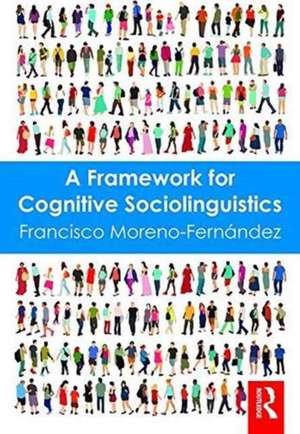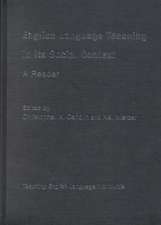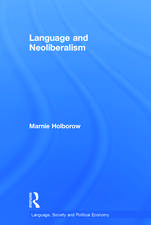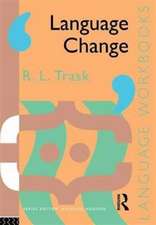A Framework for Cognitive Sociolinguistics
Autor Francisco Moreno-Fernandezen Limba Engleză Paperback – 26 sep 2016
Offering a fresh perspective on the frequently taught and studied topic of cognitive linguistics, A Framework for Cognitive Sociolinguistics can easily be incorporated into existing courses in the areas of both cognitive and sociocultural linguistics.
| Toate formatele și edițiile | Preț | Express |
|---|---|---|
| Paperback (1) | 444.62 lei 6-8 săpt. | |
| Taylor & Francis – 26 sep 2016 | 444.62 lei 6-8 săpt. | |
| Hardback (1) | 1163.63 lei 6-8 săpt. | |
| Taylor & Francis – 27 sep 2016 | 1163.63 lei 6-8 săpt. |
Preț: 444.62 lei
Nou
Puncte Express: 667
Preț estimativ în valută:
85.09€ • 92.39$ • 71.47£
85.09€ • 92.39$ • 71.47£
Carte tipărită la comandă
Livrare economică 22 aprilie-06 mai
Preluare comenzi: 021 569.72.76
Specificații
ISBN-13: 9781138681989
ISBN-10: 1138681989
Pagini: 254
Ilustrații: 24
Dimensiuni: 152 x 229 x 19 mm
Greutate: 0.34 kg
Ediția:1
Editura: Taylor & Francis
Colecția Routledge
Locul publicării:Oxford, United Kingdom
ISBN-10: 1138681989
Pagini: 254
Ilustrații: 24
Dimensiuni: 152 x 229 x 19 mm
Greutate: 0.34 kg
Ediția:1
Editura: Taylor & Francis
Colecția Routledge
Locul publicării:Oxford, United Kingdom
Cuprins
Acknowledgements
Preface
Introduction
Chapter 1. The dynamic and complex nature of language
Chapter 2. Social reality and perception
Chapter 3. Worldview, discourse and society
Chapter 4. Cognitive foundations of linguistic variation
Chapter 5. Sociosemantics and cognition
Chapter 6. Sociogrammar and cognition
Chapter 7. Sociophonology and cognition
Chapter 8. Methodology for a cognitive sociolinguistics
Chapter 9. The sociolinguistic interview
Chapter 10. The perceptual dynamics of the sociolinguistic interview
Chapter 11. The perception of linguistic variation
Chapter 12. The perception of linguistic contact
Epilogue
Preface
Introduction
Chapter 1. The dynamic and complex nature of language
Chapter 2. Social reality and perception
Chapter 3. Worldview, discourse and society
Chapter 4. Cognitive foundations of linguistic variation
Chapter 5. Sociosemantics and cognition
Chapter 6. Sociogrammar and cognition
Chapter 7. Sociophonology and cognition
Chapter 8. Methodology for a cognitive sociolinguistics
Chapter 9. The sociolinguistic interview
Chapter 10. The perceptual dynamics of the sociolinguistic interview
Chapter 11. The perception of linguistic variation
Chapter 12. The perception of linguistic contact
Epilogue
Notă biografică
Francisco Moreno-Fernández is Professor of Hispanic Linguistics at the University of Alcalá (Spain) and Executive Director of the Instituto Cervantes at Harvard University. He is co-editor of Spanish in Context, editor of Lengua y Migración/Language & Migration, and a member of the editorial boards of many journals, including Intenational Journal of the Sociology of Language, Journal of Linguistic Geography, Journal of World Languages, Revista Internacional de Lingüística Iberoamericana, and Lingüística Española Actual.
Descriere
A Framework for Cognitive Sociolinguistics attempts to lay out the epistemological system for a cognitive sociolinguistics—the first book to do so in the English language. The intention of this volume is not to provide a simple catalogue of sociolinguistic principles or of theoretical postulates of a cognitive nature, but rather aims to build a verifiable metatheoretical basis for cognitive sociolinguistics. This book is articulated through a series of propositions, accompanied by annotations and commentaries that develop, qualify and exemplify these propositions. As for the research questions that would be central to a cognitive sociolinguistic endeavor, the following incomplete catalog could be enumerated: What do speakers know about their language? What do they know about communicative interaction? What do speakers know about sociolinguistic variation? Where does that knowledge reside and how is it configured? How does social reality influence the origin and processing of language? How does language use affect the configuration, evolution and variation of language? What do speakers know about their socio-communicative context? How do speakers perceive sociolinguistic reality? What are speakers’ attitudes and beliefs regarding linguistic variation? How does sociolinguistic perception influence speakers’ communicative behavior at all levels? How does language contribute to the construction of identity?
Offering a fresh perspective on the frequently taught and studied topic of cognitive linguistics, A Framework for Cognitive Sociolinguistics can easily be incorporated into existing courses in the areas of both cognitive and sociocultural linguistics.
Offering a fresh perspective on the frequently taught and studied topic of cognitive linguistics, A Framework for Cognitive Sociolinguistics can easily be incorporated into existing courses in the areas of both cognitive and sociocultural linguistics.
























